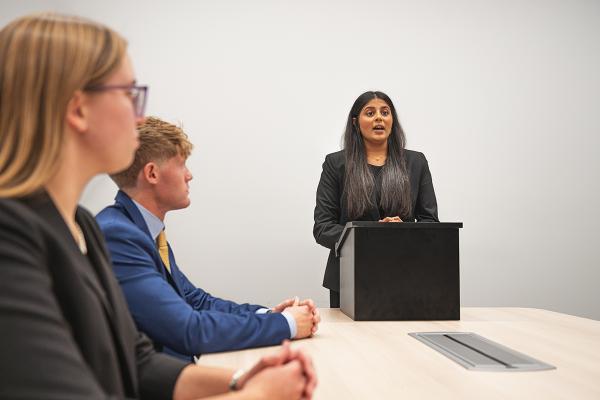A Clear Case for Investment
As one of the top 10 teams in the nation, the SVSU moot court program has earned state and national respect since the program’s formation 15 years ago. More than a challenging pre-law extracurricular activity, moot court is preparing future attorneys and community leaders for roles defending fairness, justice and the rule of law.

Moot court is an intercollegiate program that gives students the opportunity to make simulated appellate arguments in front of a panel of attorneys and judges representing the United States Supreme Court. The two-person teams are judged based on the quality of their oral arguments, written legal briefs and their knowledge of the law and case. SVSU teams compete in tournaments associated with the American Moot Court Association, the largest intercollegiate moot court organization in America.
“Our students out-compete great teams from across the nation.”
— Kevin Lorentz, SVSU professor of political science and director of SVSU's moot court program
Success in moot court requires a tremendous investment of time spent practicing and preparing for oral arguments and researching and writing legal briefs. SVSU’s program is currently ranked No. 9 in the country overall and No. 2 for brief writing, based on the 2023-2024 competition season. And in the 2024-2025 season, six SVSU students (three teams) have qualified for the national competition, an achievement attained by just 80 of the 500 moot court teams in the nation! In addition, all 11 SVSU Moot Court teams have submitted legal briefs to the AMCA's brief writing competition.
At SVSU, moot court is both a class and an extracurricular. Because having a diverse set of students with different academic backgrounds helps to bring different viewpoints to the case, the class is open to students from any academic major. However, space is limited, and participants must be accepted.
Students are coached by Kevin Lorentz, SVSU assistant professor of political science and moot court program director, and Amy Hendrickson, SVSU professor of law. They are aided by Julie Keil, former program director and political science professor, as well as moot court alumni and area legal community members who volunteer their time. This year, Abi Walk, a 2024 SVSU graduate who now works in the legal department of Dow, returned to share her competition expertise.
SVSU’s Moot Court program began in 2010 under the sole leadership of Keil. In its first year, an SVSU team qualified for the national championship, an amazing feat. In 2015, the program attained its first top 20 ranking with top performances from Samantha Jackson (B.A., 2015) and Rachel Stocki (B.B.A., 2015).
When the SVSU program first began, there were approximately 180 undergraduate moot court teams in the nation competing under the AMCA; now there are over 500. Consequently, programs are offered a very limited number of entries per regional competition. Lorentz and Hendrickson evaluate the teams throughout the season to select those who will represent SVSU at the regional competitions. Chosen teams have only one chance to qualify for nationals. With 22 students in the moot court program, many will not have the opportunity to compete in the simulated appellate argument division. However, their contributions help elevate the caliber of all team members.
“Success requires commitment. Every student who shared an idea or asked a tough question throughout those months of preparation made the team better.”
— Amy Hendrickson, SVSU associate professor of law
Despite the odds and the pressure, students recognize the value of moot court. For students who are contemplating law school, the program helps them build skills in conducting legal research, writing legal reports, crafting oral and written arguments, and analyzing case law. It provides opportunities to network with experts in the legal field and helps them discern if law school is the right path. Whether bound for law school, graduate school or employment, moot court participants come out on the other end as better critical thinkers, problem solvers, public speakers, time managers and collaborators. These skills are valued in the workplace regardless of profession.
“Moot court doesn’t get students into law school, but it helps them when they get there.”
— Julie Keil, SVSU professor of political science
Note: While SVSU's moot court program receives a limited budget from the university, students must also pay a fee to help cover travel costs and competition entry fees. While unavoidable, the fee may prohibit deserving students from participating. In addition, the time commitment of moot court often limits work hours that help students cover tuition and expenses.
To invest in future moot court students, give at svsu.edu/invest24
Find more inspiring stories at svsu.edu/invest
CONTACT US.
Foundation
Wickes Hall 398
foundation@svsu.edu
(989) 964-4052

